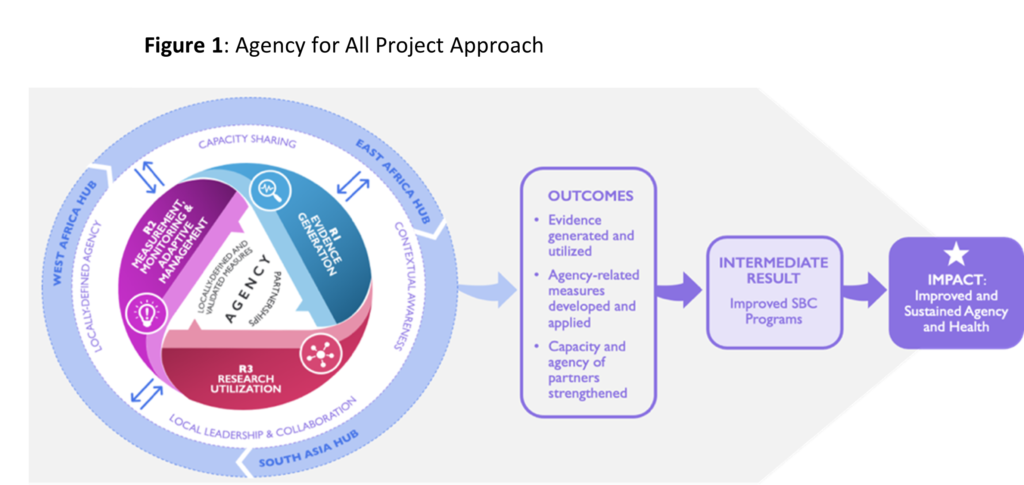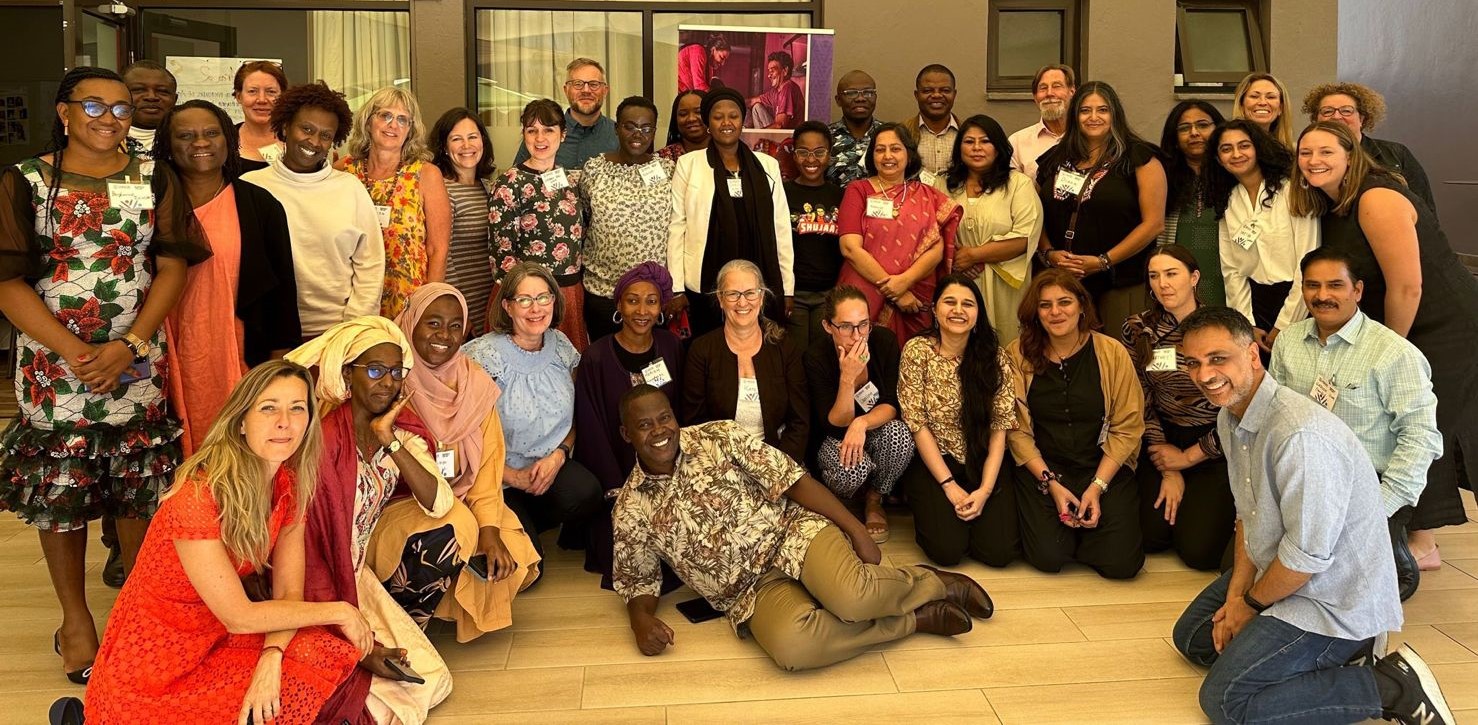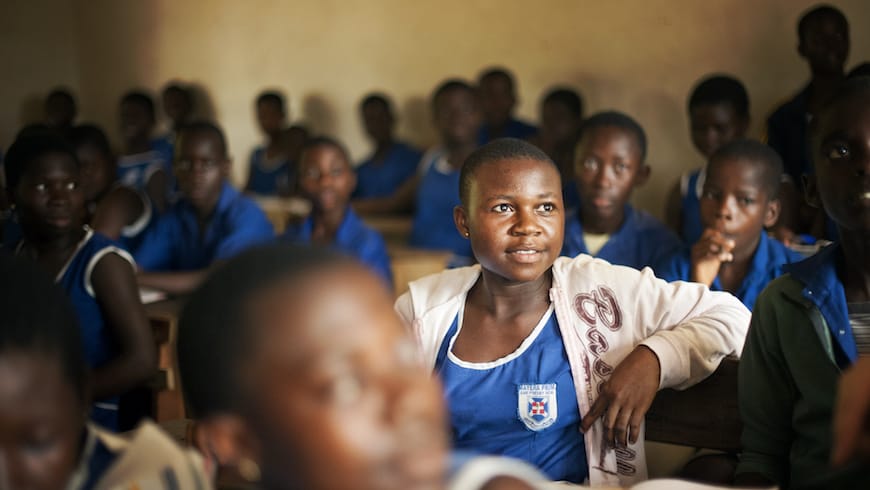Agency for All (A4All) Project

Agency for All is a five (5) years USAID-funded project (2022-2027) that operates globally in Africa and Asia. Its aim is to generate and apply evidence on agency, empowerment, and effective social and behavior change (SBC) programs. The project’s goal is to improve and sustain health and agency for women, girls and communities through locally led, equitable partnerships focused on understanding agency and its role in converting intentions into action within SBC programs. Although there is emerging evidence that empowerment-focused SBC interventions can create sustained impacts on a wide range of health outcomes across contexts, SBC interventions rarely address issues of individual, collective and organizational empowerment and agency.
To address this gap in SBC programming, the Agency for All project consortium is developing culturally and locally relevant constructs of agency, strengthening evidence on approaches to increase agency for sustained health and well-being, and fostering the agency of local partners to generate and utilize evidence.
The Agency for All project consortium is led by the Center on Gender Equity and Health (GEH) at the University of California San Diego (UCSD), in collaboration with a diverse and highly experienced consortium of global, regional, and country leaders in both implementation and research, including EVIHDAF and many others (Centre for Catalyzing Change, CORE Group, Equimundo, International Planned Parenthood Federation, Makerere University, Matchboxology, Sambodhi, Save the Children, Shujaaz Inc., University of Witswatersrand, and Viamo). This consortium works with the Social Norms & Agency Learning Collaboratives (SNALC) in East Africa, West Africa and South Asia to foster local leadership, promote positive social norms and enhancing individual and community agency to improve health. EVIHDAF, through local partnerships, covers West and Central Africa.
Agency for All Approach
Through three work streams: Evidence Generation (Result Area 1); Measurement, Monitoring and Adaptive Management (Result Area 2); and Research Utilization (Result Area 3), Agency for All develops constructs of agency that are culturally relevant, strengthens evidence on approaches that foster empowerment, and increases the agency of local partners to generate and use evidence.

Agency for All – CORE
Agency for All CORE work is taking place in Bangladesh, Cambodia, Cameroon, Ethiopia, India, Indonesia, Kenya, Madagascar, Niger, Nigeria and Uganda. Under Core, the following research activities are conducted by EVIHDAF and other consortium members:
- Designing and Implementing a Transformative Adaptation of Husbands’ Schools in Niger. This study is under Result Area 1 and seeks to engage men as role models to encourage women’s use of reproductive health services. Initially piloted in 2007, the program emphasizes power-sharing between couples to enhance men’s positive influence on women’s rights and well-being.
- Developing Measures of Agency for Social and Behavioral Change (SBC) programs. This research is under Result Area 2 and aims to develop globally validated measures of agency based on local definitions across health contexts. The study is being conducted in Cameroon, Kenya, and India.
Agency for All – Buy Ins
In addition to its core work, Agency for All is carrying out Buy In activities in several countries, including Cameroon, Madagascar, Haiti, Bangladesh, Ethiopia, Nigeria, DRC, Cambodia, Malawi, Zimbabwe, the Ouagadougou Partnership (OP) region, Niger, Indonesia, Uganda, Mali, Kenya and Burkina Faso. As part of these activities, EVIHDAF, in collaboration with other Consortium partners, is conducting 3 interventions. Two (2) of these interventions are twin studies carried out in Cameroon and Kenya, while the third is a capacity-building initiative for institutions within the Ouagadougou Partnership.
- Agency for All Africa Bureau Buy-In:
- Development of a Contraceptive Acceptability Scale This study under Result Area 1 is funded by USAID’s Africa Bureau. It aims to develop a reliable and valid scale of contraceptive acceptability in Cameroon and Kenya that can inform the design and evaluation of futures interventions.
- Informing an SBC Infertility Intervention that Supports Reproductive Agency. Placed under Result Area 1 and funded by USAID’s Africa Bureau, this study aims to reduce the stigma associated with infertility and improve reproductive agency.
- Agency for All Africa WARO Buy-In:
- Capacity Strengthening of Local Institutions to Accelerate the Ouagadougou Partnership Research Agenda. Funded by the USAID West Africa Regional Office, this initiative aims at supporting the research efforts of the Ouagadougou Partnership countries to improve their capacity to produce evidence on effective strategies.
Snapshot
Study area: Global (Africa and Asia)
Duration: 2022-2027
Consortium Partners: GEH; EVIHDAF; C3 ; Core Group ; Equimundo; IPPF; Makerere University; Matchboxology; Save the Children; Shujaaz Inc.; University of Witswatersrandrand; Sambodhi and Viamo
Funder: USAID
Targets: 1) Evidence Generation: Discover the nature and development of agency, its impact on health behaviors, and how SBC interventions can support actions to improve health. 2) Measuring, Monitoring, and Adaptive Management: Evaluate agency and social dynamics; enhance adaptive management through the integration of SBC monitoring indicators; leverage our networks, including IPPF associations, to support these methods; and offer a toolkit with MEL measures and strategies to promote their adoption. 3) Research Utilization: Change culture and practice to foster equitable partnerships in research, adopting a systems approach that focuses on awareness, collaboration, capacity and communication, to ensure the impact of new data on practice and policy.
A4All Projects
Others Ongoing Projects
Coming Soon ….

A4ALL-Annual-meeting-011

